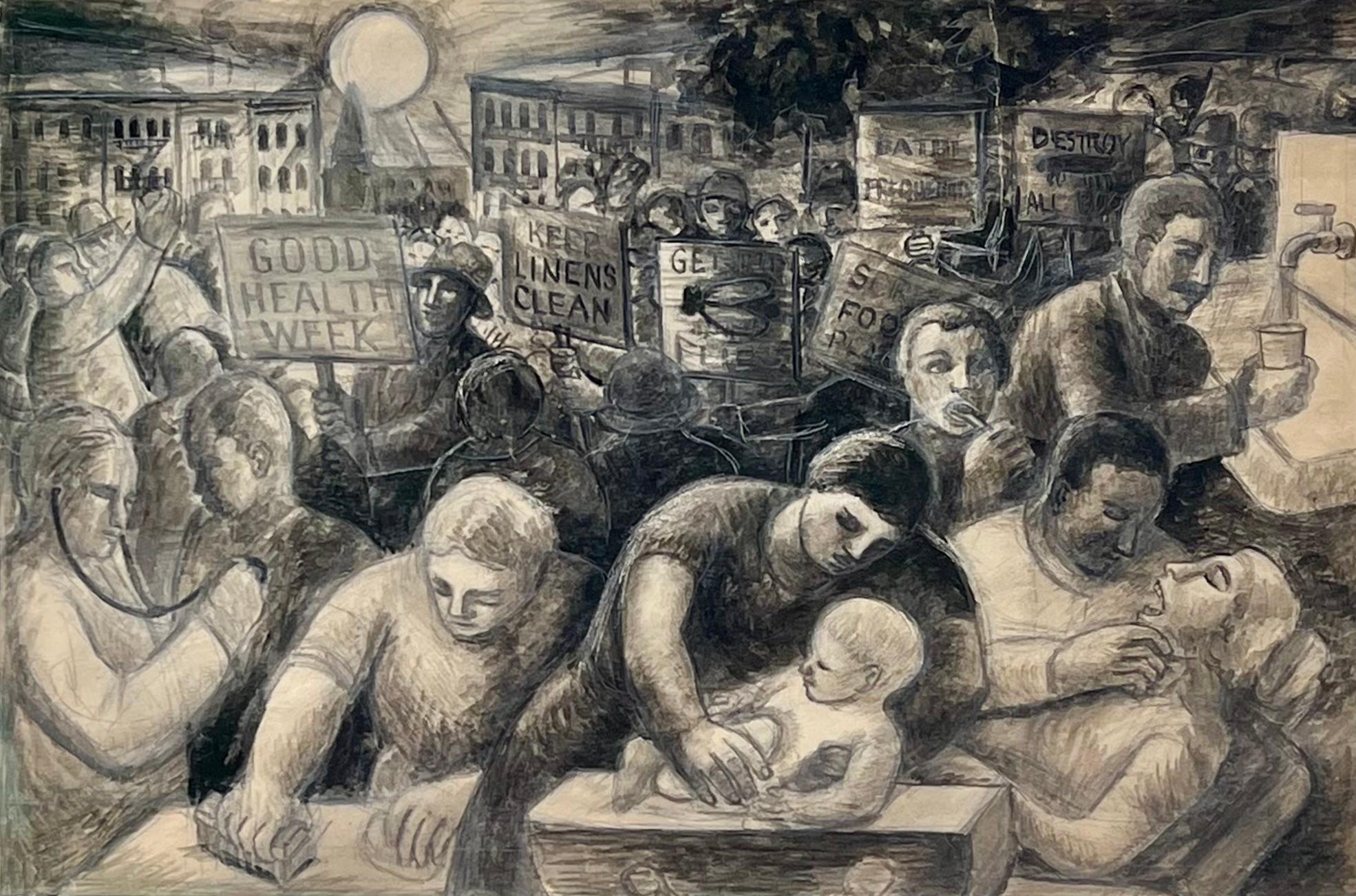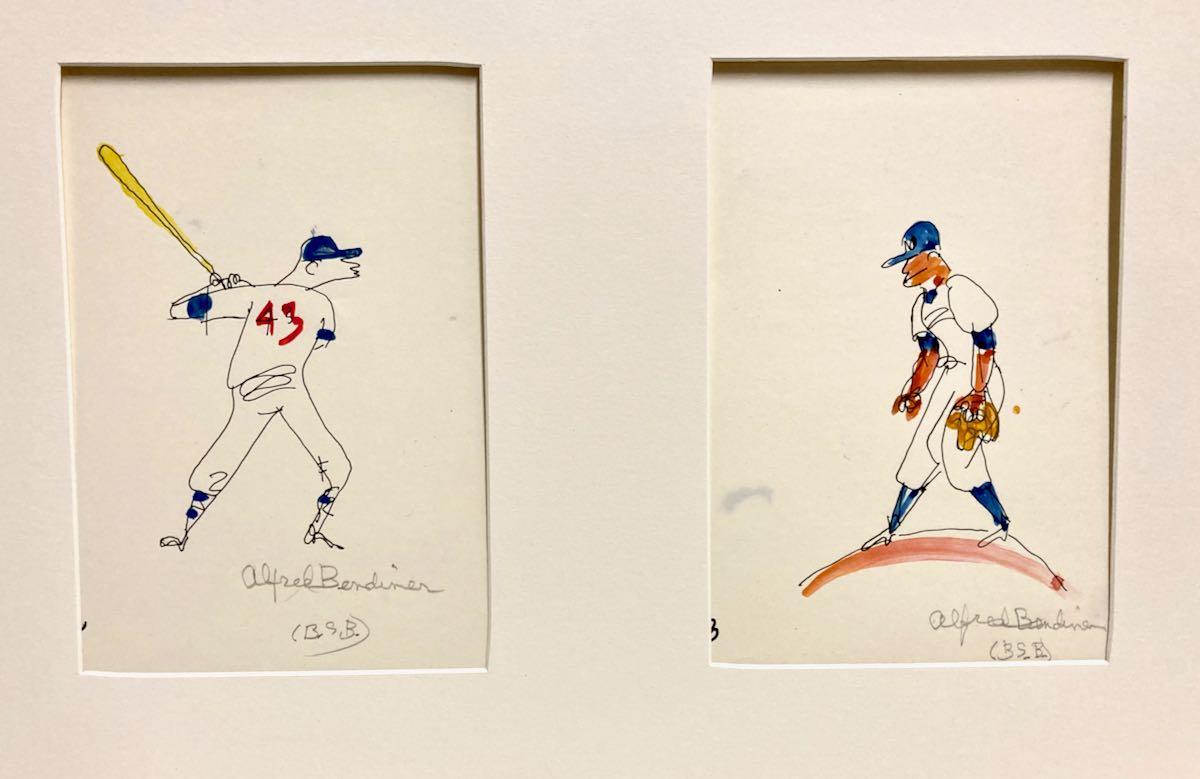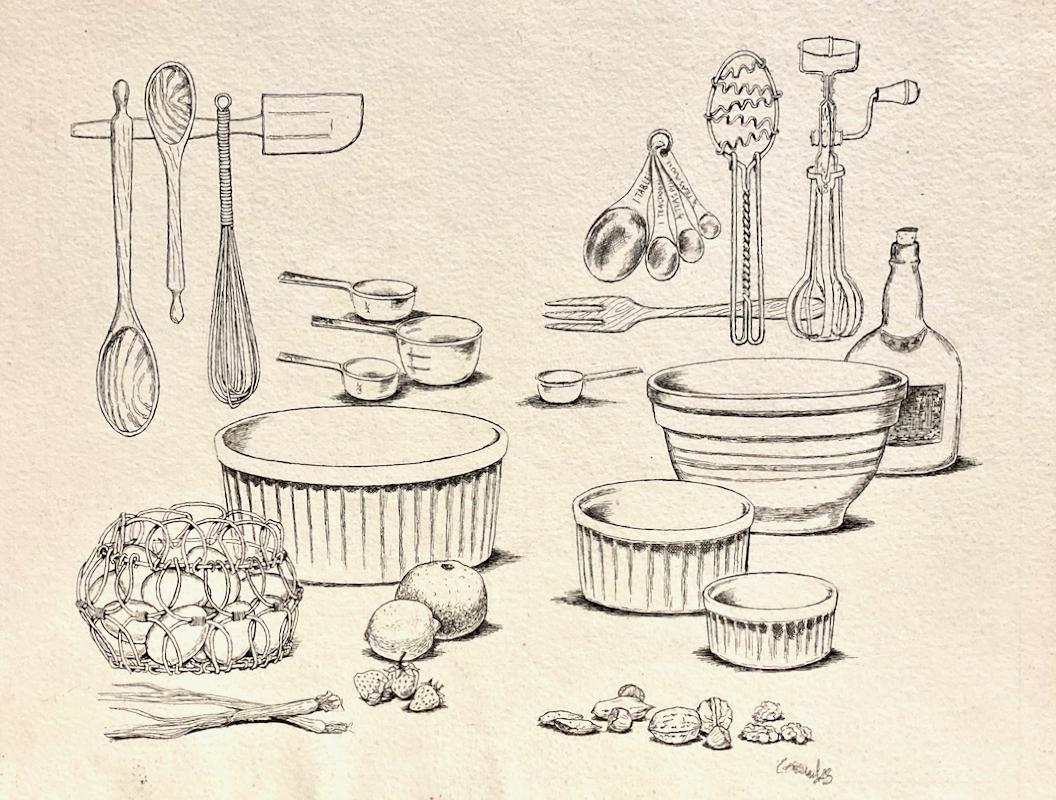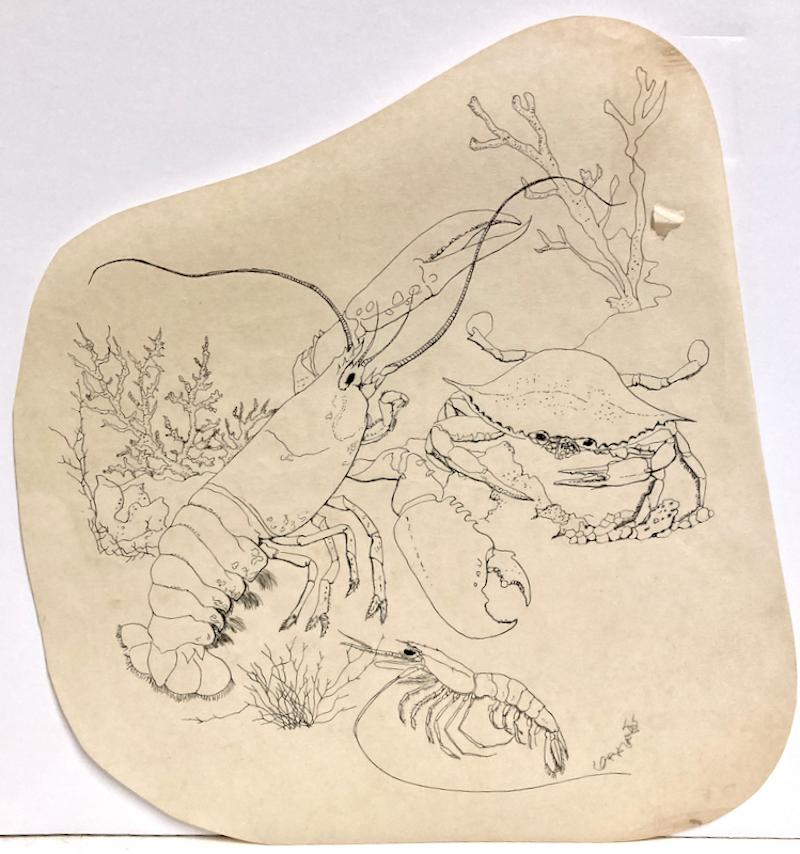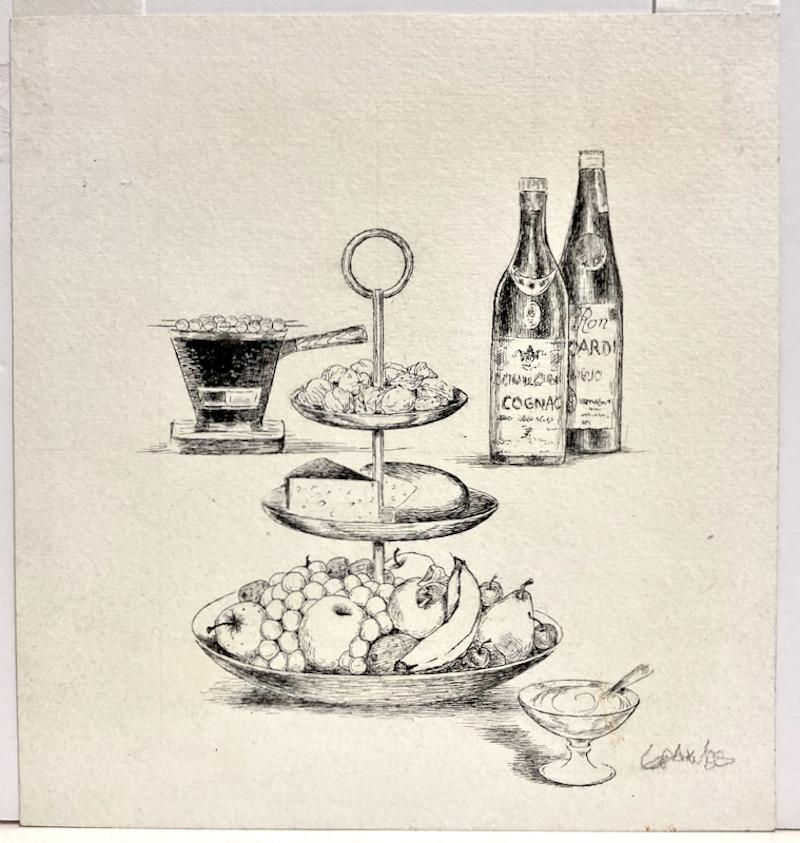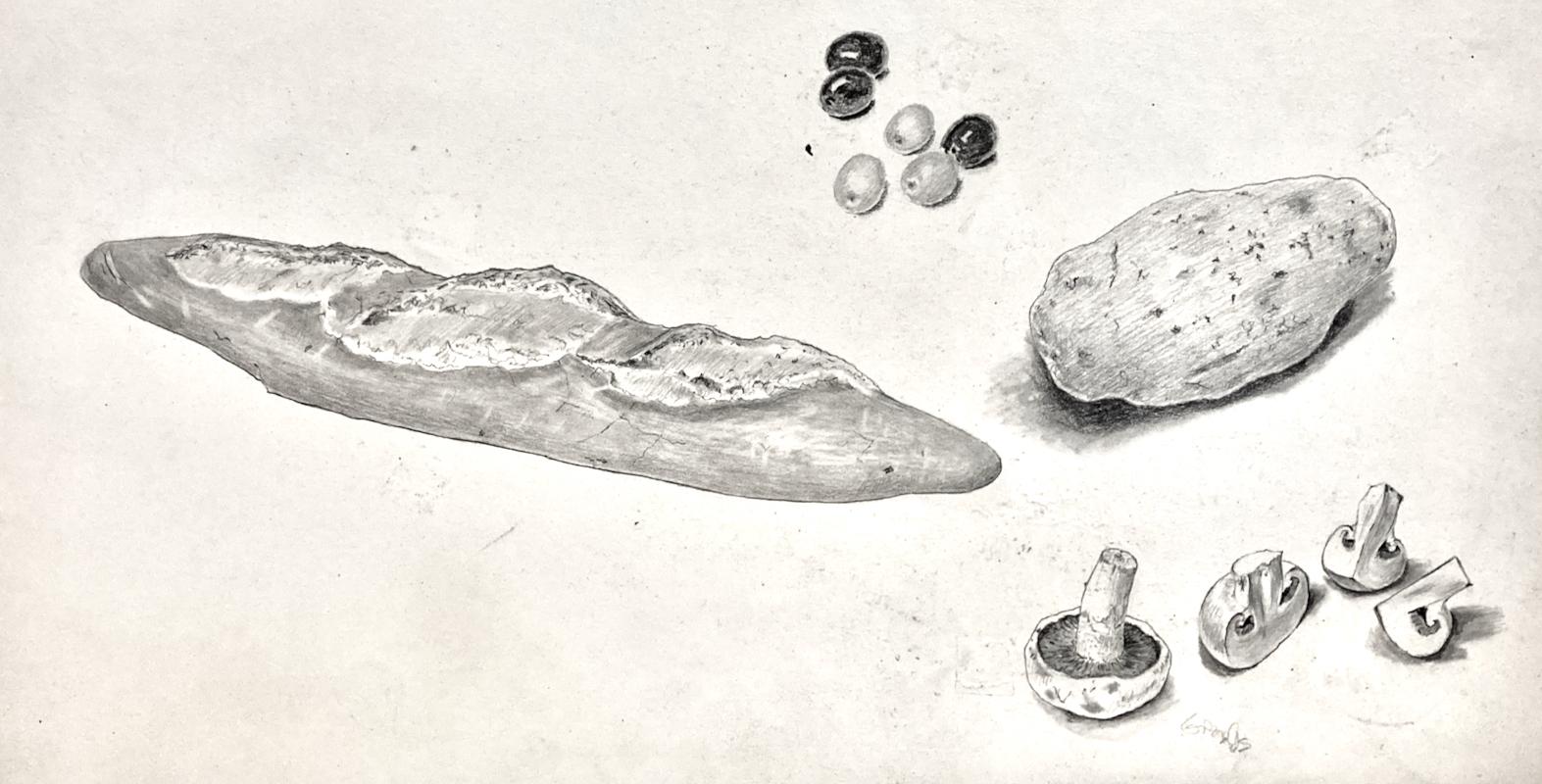Items Similar to Lower East Side Crowd
Want more images or videos?
Request additional images or videos from the seller
1 of 11
Abraham WalkowitzLower East Side Crowdc. 1910
c. 1910
About the Item
Lower East Side Crowd
Ink and ink wash on paper, c. 1910
Signed in ink lower center edge (see photo)
Signed with the initials lower right corner (see photo)
Probably depicts Jewish immigrants in the East Village of Manhattan.
Condition: Very good
Three adhesive spots verso from previous mounting
Not visible from recto
Otherwise excellent
Sheet size: 13 1/4 x 10 1/2 inches
Provenance: Estate of the artist
Note: Very similar composition and figures depicted to a dated work, 1908 in the collection of the Prnceton Art Museum (x1947-46) -see photo
Abraham Walkowitz (1878-1965)
By Bill Lasarow
Abraham Walkowitz is one of those shadowy yet familiar figures of American Modernism. He was among the small vanguard of artists who first transplanted the sprig of European Modernism here during the first decade of the 20th Century.
Born in Siberia in 1878, he was brought by his mother to the U.S. around the age of five following his father’s death. Settling into the Jewish ghetto of New York City, Walkowitz drew prodigiously as a child, and attended the Artists’ Institute and the National Academy of Design as a student. When his natural tendency towards experimentation was criticized, instead of giving in he opened up to the fresh influence of the budding European avant-garde.
Saving his money, in 1906 he joined the small flow of American expatriate artists following Alfred Maurer’s lead to Paris. There he attended the Academie Julien and soaked up the newly emerging innovations of Cubism, Fauvism, and the movement towards abstraction. Perhaps of greatest consequence to the artist, he first met the dancer Isadora Duncan during this stay. He ultimately made more drawings of her “than I have hairs on my head,” by his own account, recalling her figure as his archetype for the next four decades, even well after her death.
These drawings, at times highlighted with a wash of color that defines Duncan’s dress, resemble the movement studies now familiar to any art student. Line is used to react to a model in motion--feeling out the look of the figure replaces the careful observation that goes into extended posing. Walkowitz’ movement studies, however, arose out of a spirit of innovation rather than an art school environment. He was developing a felt sensibility, an intuitively expressive set of marks.
The importance of Cezanne, Matisse, Picasso and Braque on Walkowitz’ approach is clear enough.
The notion that art is a non-verbal language that holds a kinship with music, dance and other similarly non-verbal means of expression may not resonate with possibility anymore. But a century ago it propelled Wassily Kandinsky into the new realms of non-referential abstraction. Walkowitz was among this new generation of true believers in a new visual language that would emerge from the inner life of the artist. Indeed, he did not hesitate to try his hand at the pure abstraction pioneered by Kandinsky.
While Walkowitz never developed an art that was sufficiently commanding or original to place him at the front rank of American Modernism, his place immediately behind was well earned. It is difficult to appreciate the level of inner certainty Walkowitz and other members of the nascent avant-garde clearly possessed--from the time of his first exhibition in 1908 he had to learn to accept ridicule. As a member of Alfred Steiglitz’ inner circle and a regular exhibitor at his renowned 291 Gallery until it closed in 1917, and as an active participant in the keystone Armory Show of 1913, Walkowitz quite knowingly accepted that oftentimes large numbers of visitors would attend his shows and those of his close colleagues not to admire but to laugh at what they saw.
After the First World War the artist continued to work prolifically, though within parameters already set before the War, until the late 1940s, when his eyesight failed. In 1963, two years before his death, the blind artist was honored by the American Academy of Arts and Letters, to some degree bearing out his own description of the career of an artist: first jeers, then sneers, and finally cheers.
- Creator:Abraham Walkowitz (1878 - 1965, American)
- Creation Year:c. 1910
- Dimensions:Height: 13.25 in (33.66 cm)Width: 10.5 in (26.67 cm)
- Medium:
- Movement & Style:
- Period:
- Condition:
- Gallery Location:Fairlawn, OH
- Reference Number:
About the Seller
5.0
Recognized Seller
These prestigious sellers are industry leaders and represent the highest echelon for item quality and design.
Platinum Seller
These expertly vetted sellers are 1stDibs' most experienced sellers and are rated highest by our customers.
Established in 1978
1stDibs seller since 2013
711 sales on 1stDibs
Typical response time: 1 hour
Associations
International Fine Print Dealers Association
- ShippingRetrieving quote...Ships From: Fairlawn, OH
- Return PolicyA return for this item may be initiated within 10 days of delivery.
More From This SellerView All
- Provincetown (Sunbathing)By Peter GrippeLocated in Fairlawn, OHProvincetown (Sunbathing) Sepia ink on tan paper, 1966 Signed in ink lower center (see photo) Exhibited: Art from Lexington Homes, Lincoln Massachusetts...Category
1960s American Modern Figurative Drawings and Watercolors
MaterialsInk
- Bull Ring Brass - Mexico CityBy Stephen LongstreetLocated in Fairlawn, OHBull Ring Brass - Mexico City Watercolor, pen and ink on paper, 1955 Signed in ink, dated and titled in pencil (see photos) Condition: 1'' repaired tear left edge, along with other minor tears. Tape stains from previous matting visible in the four corners Image/Sheet size: 19 3/8 x 15 5/8 inches Provenance: Acquired directly from the Artist Joseph M. Erdelac, Cleveland, friend and patron of Longstreet Stephen Longstreet (1907-2002) The artist’s own grandchildren attempt to fathom the real life and nature of Stephen Longstreet, prolific author, artist, screenplay writer, and jazz aficionado. Born Chauncy Weiner (sometimes spelled Wiener) in New York City in 1907, Longstreet reinvented himself on a regular basis. Changing his name first to “Henry,” then “Henri,” he started his career as a commercial artist for a department store. In various public biographies he claimed to have studied in New York, London, and Paris, and said he was a student of cartoonist Ralph Barton (1891-1931). Facts that can be documented are that he was art editor for Golfer and Sportsman magazines, and was a contributor to various other magazines including The New Yorker, Saturday Evening Post, Colliers, Life, and Hooey, among others. He wrote sketches for NBC radio and the Rudy Vallee Show. In the 1930s, Longstreet worked and wrote under the names Thomas Burton, David Ormsbee, and Paul Haggard...Category
1950s American Modern Figurative Drawings and Watercolors
MaterialsIndia Ink, Watercolor, Pen
- New Orleans Sportin HouseBy Stephen LongstreetLocated in Fairlawn, OHNew Orleans Sportin House Pen and ink on paper, 1951 Signed in ink, titled and dated in pencil (see photos) Condition: Corners are pasted to support sheet, some staining in image. Image/sheet size: 15 5/8 x 18 inches Provenance: Acquired from the artist Joseph M. Erdelac, Cleveland, patron and friend of the artist Stephen Longstreet (1907-2002) The artist’s own grandchildren attempt to fathom the real life and nature of Stephen Longstreet, prolific author, artist, screenplay writer, and jazz aficionado. Born Chauncy Weiner (sometimes spelled Wiener) in New York City in 1907, Longstreet reinvented himself on a regular basis. Changing his name first to “Henry,” then “Henri,” he started his career as a commercial artist for a department store. In various public biographies he claimed to have studied in New York, London, and Paris, and said he was a student of cartoonist Ralph Barton...Category
1950s American Modern Figurative Drawings and Watercolors
MaterialsInk
- Preliminary Study for a Sculpture ProjectBy Boris Lovet-LorskiLocated in Fairlawn, OHPreliminary Study for a Sculpture Project Graphite, charcoal and wash on tracing paper, c. 1930-1940 Signed upper left and lower left (see both photos) Created while the artist was l...Category
1930s American Modern Figurative Drawings and Watercolors
MaterialsCharcoal
- Quick ChangeBy Honore GuilbeauLocated in Fairlawn, OHQuick Change Watercolor on paper, 1930-1931 Signed lower right: Honore Guilbeau Illustrated in American Art Review, August 2014, page 84 in an article by Dr. M...Category
1930s American Modern Figurative Drawings and Watercolors
MaterialsWatercolor
- Bull engaging the muleta (Bull Fight)By Robert HallowellLocated in Fairlawn, OHBull engaging the muleta (Bull Fight) Signed with the Estate stamp lower left (See photo) Provenance: Estate of the Artist Marbella Gallery Inc., NYC Refer...Category
Mid-20th Century American Modern Animal Drawings and Watercolors
MaterialsWatercolor
You May Also Like
- "Good Health Week" American Scene Modern Social Realism Double Sided WPA EraBy Jo CainLocated in New York, NY"Good Health Week" American Scene Modern Social Realism Double Sided WPA Era Jo Cain (1904 - 2003) Good Health Week – double sided 13 3/4 x 20 1/2 in...Category
1930s American Modern Figurative Drawings and Watercolors
MaterialsInk, Paper, Gouache
- Alfred Bendiner, (Baseball Hitter and Pitcher -- The Philadelphia Phillies?)By Alfred BendinerLocated in New York, NYOf course it's possible that these baseball players aren't from a Philadelphia team, but I doubt it. There was so much drama and intrigue with both the Philadelphia Phillies and the ...Category
Mid-20th Century American Modern Figurative Drawings and Watercolors
MaterialsIndia Ink, Watercolor
- Blanche Grambs, (Study for a Souffle)Located in New York, NYIn the 1950s and 60s Grambs worked on many commissions. The symmetrical nature of the drawing suggests it was for a book or magazine project with facing pages -- possibly a cookboo...Category
Mid-20th Century American Modern Figurative Drawings and Watercolors
MaterialsInk
- Blanche Grambs, (Shell Fish: Lobster, Crab, and Shrimp)Located in New York, NYIn the 1950s and 60s Grambs worked on many commissions. This ink drawing with a lobster, crab, and a shrimp, was probably for a cookbook; the sheet is cut in a free-form, modernist...Category
Mid-20th Century American Modern Figurative Drawings and Watercolors
MaterialsInk
- Blanche Grambs, (Lazy Susan)Located in New York, NYIn the 1950s and 60s Grambs worked on many commissions. This was probably for a cookbook. The dimensions are for the drawing. The sheet is somewhat larger, 7 x 6 1/2 inches.Category
Mid-20th Century American Modern Figurative Drawings and Watercolors
MaterialsInk
- Blanche Grambs, (Cooking Still Life: Bread, Olives, Potato, Mushrooms)Located in New York, NYIn the 1950s and 60s Grambs worked on many commissions. This drawing was probably for a magazine, perhaps House and Garden or House Beautiful. It is signed and dated in pencil on the...Category
Mid-20th Century American Modern Figurative Drawings and Watercolors
MaterialsInk, Pencil
Recently Viewed
View AllMore Ways To Browse
Look To The Side
Crowd Art
American Immigrant
Ago Side
Crowd Painting
Lower Manhattan
East Head
American Cubism
Lower East Side
Original Line Drawing Large
Large Original Line Drawing
Figurative Crowd Paintings
Set Of Four Watercolors
Dancer Figure Drawing
Crowd Study
1919 Dress
Cheers Art
20th Century Fauvism Painting
